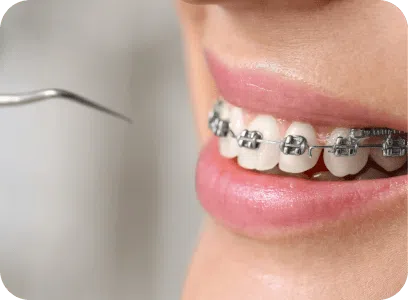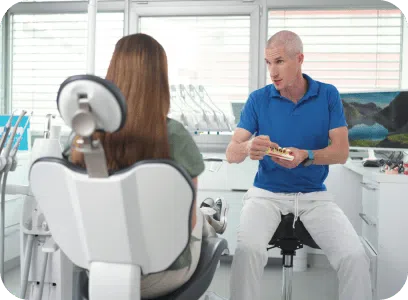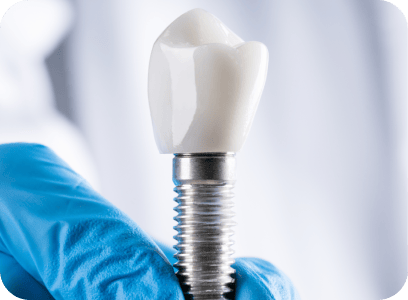Endodontics
Root canal treatment is typically performed in cases of tooth pain. This pain often results from inflammation of the dental nerve due to deep cavities. In many instances, treatment is also carried out on so-called dead teeth, where the dental nerve has already degenerated, followed by bacterial infection. It is essential to properly treat such teeth to eliminate pain and ensure they remain functional for many years.

Specialist treatment
Our team includes experienced endodontists who specialize in root canal treatment. With their expertise and knowledge, you will receive top-notch care for your dental roots.
Advanced technologies
At Modri Zob, we use the latest technology and equipment, allowing for precise diagnosis and root canal treatment with the most gentle and effective procedures.
Preservation of natural teeth
With endodontics, you can preserve your natural teeth and avoid the need for extraction, which is crucial for the long-term health and aesthetics of your smile.
Root canal treatment
Endodontics, also known as root canal treatment, is a specialized dental service focusing on treating the internal parts of the tooth, such as the pulp and roots. At Modri Zob, we offer excellent endodontic care that allows you to preserve your natural teeth even in cases of severe damage.
Symptoms
If you have any of the following symptoms, there is a high probability that you need root canal treatment: pain in the tooth when biting, tooth sensitivity to pressure, toothache that wakes you up at night, swelling above the tooth, pain that radiates to other teeth or areas of the head (ear, throat, eye, etc.), moderate to severe tooth pain when consuming hot or cold drinks.
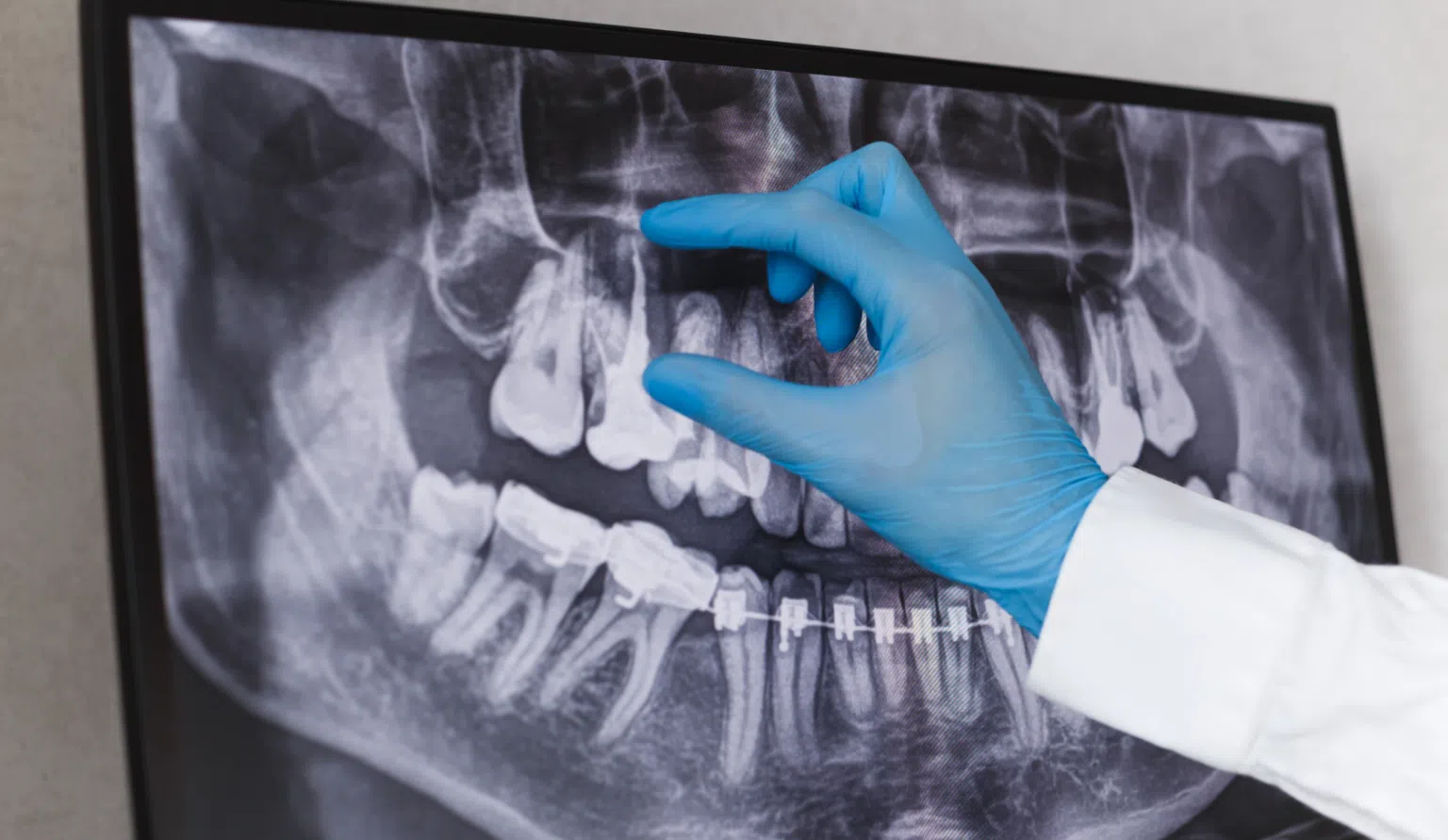
How does the root canal treatment process work?
Diagnosis and preparation
The process begins with a thorough diagnosis, where the dentist or endodontist will assess the condition of the tooth and determine if endodontic care is necessary. They will use X-rays and other diagnostic methods to determine the extent of problems in the roots and pulp of the tooth. Based on the diagnosis, a treatment plan is developed.
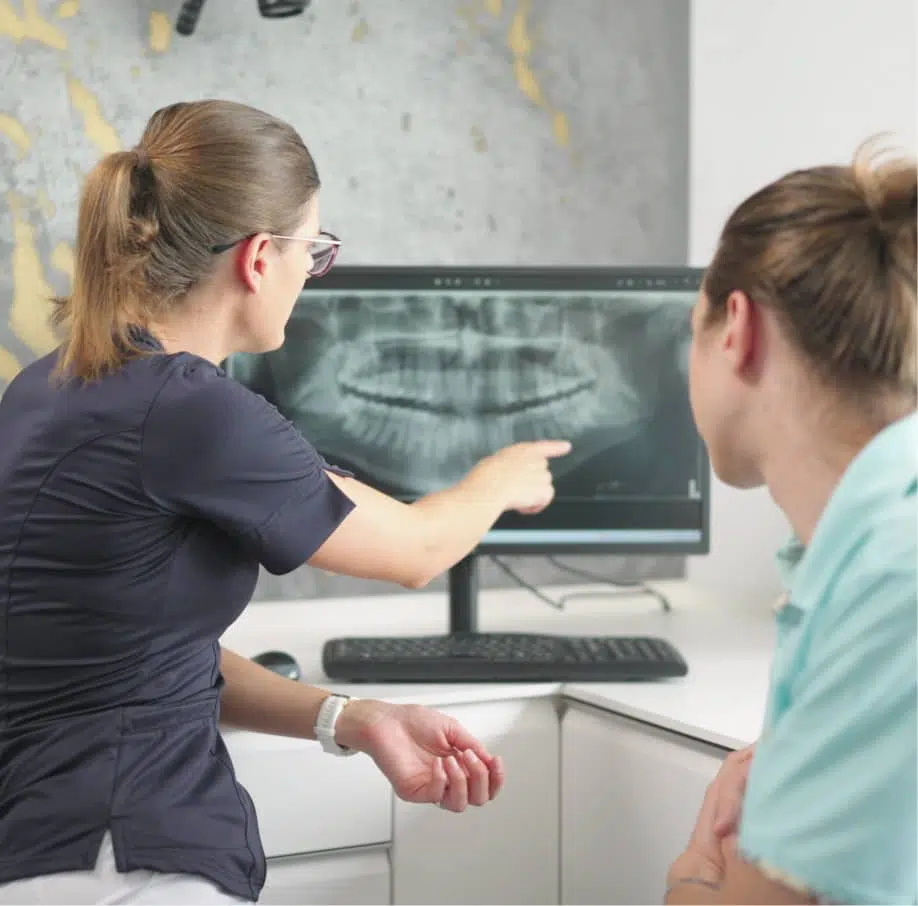

Local anesthesia and access to roots
Before starting the endodontic treatment, you will receive local anesthesia to ensure complete painlessness during the procedure. Once the anesthesia takes effect, the dentist or endodontist will create a small access point in the tooth to reach the root canals. Through this access, they will remove the infected or damaged dental pulp.
Cleaning and filling the root canals
The next step is cleaning and shaping the root canals. The dentist will remove remnants of the dental pulp and carefully clean the root canals to eliminate all bacteria and infection. After cleaning, the root canals are filled with a special sealing material to prevent reinfection. Once the procedure is completed, the tooth is usually restored with a final restoration to restore its functionality and aesthetics.
Experienced team of specialists
Our experienced team of endodontic specialists brings a wealth of experience and knowledge, ensuring safe, effective, and personalized root canal treatment.
Advanced technology
At Modri Zob, we use the latest technology and equipment for endodontic treatment, allowing for precise and painless procedures.
Individual approach
Every endodontic procedure is tailored to each patient to achieve the best possible results based on the condition of their tooth.
Comprehensive support
Our endodontists provide comprehensive support before, during, and after the endodontic treatment, ensuring you feel comfortable and cared for throughout the entire process.
Patients love us
... and their new smiles! 🙂

Modri zob Nova Gorica

Modri zob Kranj

Modri zob Kranj

Modri zob Kranj

Modri zob Nova Gorica

Modri zob Nova Gorica
Answers to frequently asked questions
How does root canal treatment work?
The first step in treatment is appropriate anesthesia (numbing) of the tooth area to ensure no pain during the procedure. A small hole is then made in the top of the tooth to access the root canals. Each root canal is carefully cleaned and reshaped with endodontic files. Canals prepared in this way can be filled with medicine in the first visit and sealed with a suitable material in the next visit to prevent recurrence of infection.
Endodontically treated teeth are usually weaker and therefore usually require a coating. Less damaged teeth can be treated with just a filling.
Is root canal treatment painful?
Endodontic care is performed under local anesthesia, so the procedure is usually not painful. However, some discomfort may be felt after the procedure, which can be managed with mild pain relievers.
How long does endodontic treatment take?
The duration of endodontic treatment depends on the complexity of the case and the condition of the tooth. It typically takes one to two hours but can be extended in the case of complications.
Is endodontic treatment always successful?
The success of endodontic treatment depends on many factors, including the condition of the tooth and post-procedure care. In most cases, endodontic treatment is successful and allows for the preservation of the natural tooth.
How to prepare for endodontic treatment?
Before endodontic treatment, your dentist will provide all necessary information and advice for preparation. Usually, no special preparations are needed except to attend the scheduled appointment.
How long does recovery after endodontic treatment take?
Recovery after endodontic treatment varies for each individual, but usually does not require a long recovery period. Some patients can resume daily activities the same day, but it is advisable to avoid hard and hot foods until the tooth fully heals.
Why does a tooth without a nerve (dead tooth) hurt?
A tooth with a dead dental nerve can cause spontaneous and/or biting pain. Pain develops when inflammation at the root tip acutely worsens and presses on the surrounding bone. In this case, root canal treatment is necessary.
When a tooth with root canal treatment hurts, it is usually a sign that the treatment has not been successful – even though the canals have been filled, the inflammation at the top of the roots persists and spreads. In this case, the dentist will try to find the cause of the unsuccessful treatment and suggest further treatment (retreatment of the roots, surgical removal of inflammation (apicoectomy), referral to a specialist endodontist).
Can inflammation in the root canals be related to sinus pain?
Inflammation from the tooth can spread and lead to sinusitis. This is especially common with inflammation of the root canals of upper molars, as the roots of some upper molars can extend into the maxillary sinus.
You might also be interested in...
